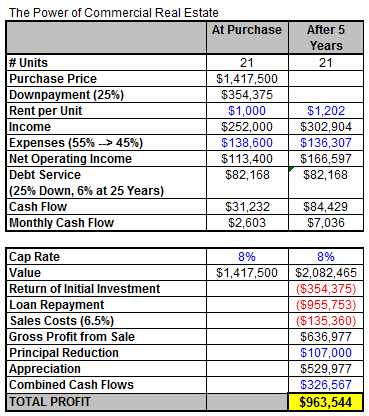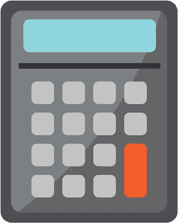This is the story of how to add $1M to your net worth in 5 years by purchasing a 21-unit apartment building at fair market value, raising the rents by just $100 per unit and controlling costs.
When I first got started with real estate investing, I chose to flip houses. I felt like I could wrap my head around that and have a reasonable shot at being successful. Not long after that decision, I met an experienced investor (we’ll call him “Sam”) who owned some multifamily properties. He didn’t judge my decision, but he did point out that commercial real estate has three ways of making money, while flipping houses (and wholesaling for that matter) only had one.
He said, “Son, why are you wasting time with houses?”
“Don’t you know that you can make money three ways with commercial real estate? And the money you can make with it is a whole lot more than with houses.” He went on to explain that commercial real estate can make you money from cash flow (which I knew, duh!), from the tenants paying down the loan (makes sense) and also from appreciation that you control (say what?). According to Sam, when you put all three together, you can create extraordinary wealth.
“Here, let me show you.” Then he sat me down with a simple scenario that I will now share with you.
The Scenario
Imagine that you purchase a 21-unit apartment building at fair market value (an 8% cap rate for this scenario). The current average income per unit (after vacancies, etc.) is $1,000 per month.
You found this deal through a residential real estate broker who is a friend of the owner. The owner is an older gentleman who has owned the building for years. His property manager kept up with repairs, but they have chosen not to raise rents in a long while to keep the tenants. While he’s done a good job keeping turnover low, his expenses are unusually high.
In reality, the rents in the market are actually $200 higher per unit, maybe even more if you fix the place up. You and your property manager within a year or two could decrease expenses by 10%.
You decide to purchase the building because actual financials indicate an 8% cap rate. Your goal after TWO years is to have increased the average income per unit by $100 per month and to have decreased expenses from 55% of income to 45%.
Sound outrageous so far? No. Doable. Absolutely.
Now take a look at the (financial) results of this plan when you combine all 3 profit centers (cash flow, loan amortization, and appreciation) — your total profit is one million dollars after you sell in five years:
NOTE: Before you flame me in the comments below, let me just say that I’m keeping this model as simplistic as possible to make a point. For example, I don’t accommodate things like closing costs, bad debt, upfront renovations or if you have investors (which you should). I have a much more sophisticated deal analyzer that incorporates these things, but this is not necessary for our discussion.
Raising the rent by only $100 per unit and decreasing expenses by 10% of income increases the net income by $53,000 per year. Not a huge amount, it seems, but when you apply an 8% cap rate to that number, that translates into an increase in value of the building by about $660,000.
Staggering.
And this doesn’t even count the principal reduction of $121,000 (principal that is being repaid by your tenants!) or the cash flow of $407,000 you’ve enjoyed over the past five years.
You took a $350,000 down payment, optimized the performance of this building, and parlayed that into one million dollars in five years.
Conclusion
Very few other businesses allow you to leverage your time, money, and skills in the way the commercial real estate does, which is why it’s the BEST way to achieve your financial goals using real estate.
My meeting with Sam was eye-opening for me, and I’m glad he cared enough to share his experience with me. From that point on, I vowed to get out of flipping houses (as profitable as it was!) and get serious about apartment building investing. Now it’s my primary focus, and I enjoy helping others do the same.
Maybe this article will inspire you to do the same. What do you think: Is commercial real estate the best way to achieve financial freedom?


You’re right, it is simple, but that makes it easier to understand and grasp the larger lesson.
Couple of questions, why is it better to use investors – if one single investor has all the down payment? Would it be for value add experience? Also, Murphys law says an older apartment building will have a major unforeseen expense, if I buy it. Didn’t see that factored in… ….great write up & video, thoroughly enjoyed!!
Only thing i’m Not following are the dual entries For principal reduction and loan payoff. Is not the principal reduction already baked into the loan payoff since you are paying less than the original loan amount by a factor of the principal reduction?
Only thing i’m Not following are the dual entries For principal reduction and loan payoff. Is not the principal reduction already baked into the loan payoff since you are paying less than the original loan amount by a factor of the principal reduction?